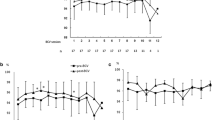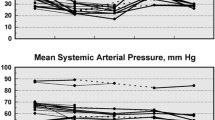Abstract
Since pulmonary hypertension (PH) due to left-sided heart failure (HF) with elevated pulmonary vascular resistance (PVR) is contraindication for heart transplantation (HTx), correct evaluation of reversibility in PVR is essential for adequate therapeutic decision-making. However, guidelines or recommended protocols for pharmacological testing to evaluate the reversibility of PVR have not been established yet. In this report, we presented a 34-year-old male with advanced HF complicated by severe PH with high PVR [5.93 Wood units (WU)] who was deemed eligible for HTx. To evaluate his HTx candidacy, oxygen inhalation test was applied during right heart catheterization (RHC) and PVR was drastically decreased to 2.29 WU. At that time, acute response test to adaptive servo-ventilation (ASV) was also applied and use of ASV temporarily but substantially decreased PVR to 2.15 WU. From the results of both oxygen inhalation test and acute response test to ASV, reversibility of PVR in this patient was confirmed, and the patient was approved as HTx candidate and received left ventricular assist device (LVAD) implantation for bridge to transplant. After LVAD implantation, PVR substantially and persistently decreased to 2.4 WU. These findings indicate that acute response test to ASV during RHC may be a possible modality to evaluate the reversibility of PVR in HF patients with PH complicated by elevated PVR.

Similar content being viewed by others
References
Guglin M, Khan H. Pulmonary hypertension in heart failure. J Card Fail. 2010;16:461–74.
Stehlik J, Edwards LB, Kucheryavaya AY, Benden C, Christie JD, Dipchand AI, Dobbels F, Kirk R, Rahmel AO, Hertz MI. The registry of the international society for heart and lung transplantation: 29th official adult heart transplant report—2012. J Heart Lung Transplant. 2012;31:1052–64.
Klotz S, Deng MC, Hanafy D, et al. Reversible pulmonary hypertension in heart transplant candidates—pretransplant evaluation and outcome after orthotopic heart transplantation. Eur J Heart Fail. 2003;5:645–53.
Teschler H, Döhring J, Wang YM, Berthon-Jones M. Adaptive pressure support servo-ventilation: a novel treatment for Cheyne-Stokes respiration in heart failure. Am J Respir Crit Care Med. 2001;164:614–9.
Takama N, Kurabayashi M. Effectiveness of adaptive servo-ventilation for treating heart failure regardless of the severity of sleep-disordered breathing. Circ J. 2011;75:1164–9.
Haruki N, Takeuchi M, Kaku K, Yoshitani H, Kuwaki H, Tamura M, Abe H, Okazaki M, Tsutsumi A, Otsuji Y. Comparison of acute and chronic impact of adaptive servo-ventilation on left chamber geometry and function in patients with chronic heart failure. Eur J Heart Fail. 2011;13:1140–6.
Yamada S, Sakakibara M, Yokota T, Kamiya K, Asakawa N, Iwano H, Yamada S, Oba K, Tsutsui H. Acute hemodynamic effects of adaptive servo-ventilation in patients with heart failure. Circ J. 2013;77:1214–20.
Guazzi M, Galie N. Pulmonary hypertension in left heart disease. Eur Respir Rev. 2012;125:338–46.
Mehra MR, Kobashigawa J, Starling R, Russell S, Uber PA, Parameshwar J, Mohacsi P, Augustine S, Aaronson K, Barr M. Listing Criteria for Heart Transplantation. International Society for Heart and Lung Transplantation guidelines for the care of cardiac transplant candidates—2006. J Heart Lung Transplant. 2006;25:1024–42.
Givertz MM, Hare JM, Loh E, Gauthier DF, Colucci WS. Effect of bolus milrinone on hemodynamic variables and pulmonary vascular resistance in patients with severe left ventricular dysfunction: a rapid test for reversibility of pulmonary hypertension. J Am Coll Cardiol. 1996;28:1775–80.
Radovancevic B, Vrtovec B, Thomas CD, Croitoru M, Myers TJ, Radovancevic R, Khan T, Massin EK, Frazier OH. Nitric oxide versus prostaglandin E1 for reduction of pulmonary hypertension in heart transplant candidates. J Heart Lung Transplant. 2005;24:690–5.
Roberts DH, Lepore JJ, Maroo A, Semigran MJ, Ginns LC. Oxygen therapy improves cardiac index and pulmonary vascular resistance in patients with pulmonary hypertension. Chest. 2001;120:1547–55.
Seals DR, Suwarno NO, Dempsey JA. Influence of lung volume on sympathetic nerve discharge in normal humans. Circ Res. 1990;67:130–41.
Johnston WE, Vinten-Johansen J, Santamore WP, Case LD, Little WC. Mechanism of reduced cardiac output during positive end-expiratory pressure in the dog. Am Rev Respir Dis. 1989;140:1257–64.
Conflict of interest
The authors declare that they have no conflict of interest.
Author information
Authors and Affiliations
Corresponding author
Additional information
M. Hieda and O. Seguchi authors contributed equally to this work.
Rights and permissions
About this article
Cite this article
Hieda, M., Seguchi, O., Mutara, Y. et al. Acute response test to adaptive servo-ventilation, a possible modality to assessing the reversibility of pulmonary vascular resistance. J Artif Organs 18, 280–283 (2015). https://doi.org/10.1007/s10047-015-0833-1
Received:
Accepted:
Published:
Issue Date:
DOI: https://doi.org/10.1007/s10047-015-0833-1




